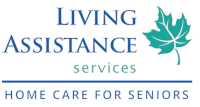When you hear a word like ‘malnutrition,’ you may associate it with serious illness, a lack of resources or even neglect. However, it’s something that’s common in older individuals for a variety of reasons—even seniors with access to high quality, healthy food and a great support system. As The Lancet medical journal notes, “Malnutrition is a highly prevalent condition in older adults, and poses a substantial burden on health, social, and aged-care systems. Older adults are vulnerable to malnutrition due to age-related physiological decline, reduced access to nutritious food, and comorbidity.” Malnutrition in seniors may be related to dental issues, cognitive impairment, difficulty self-feeding, isolation, anxiety or grief, among other risk factors. It can also present after a stroke or other medical trauma.
Seniors with dementia, diabetes, emphysema or other physical ailments may also be at increased risk of malnutrition, even if they’re well cared for by family members. Malnutrition can lead to several physical, cognitive and behavioural manifestations. By being aware of the signs of malnutrition and other dietary issues, you’ll be better equipped to support your aging loved ones and help them enjoy a better quality of life. Here are some signs to look for in your older family members—for more information, please contact us. We’d be glad to discuss your concerns and identify ways that our caregivers can support the health of your loved ones.
Physical markers
Malnutrition can often be identified through physical signs, including the following:
- Unexplained weight loss (wasting) and sarcopenia (a loss of muscle mass)
- Brittle, dry hair that breaks easily and/or increased hair loss
- Ridged or spoon-shaped nails that curve away from the nail bed (this is a possible sign of iron deficiency)
- Cracked corners of the mouth, inflammation of the mouth or tongue, or a pale/swollen tongue (another sign of iron deficiency)
- Digestive issues such as diarrhea (a potential sign of nutrient malabsorption or digestive issues such as IBS/Crohn’s Disease)
- An unhealthy pallor or paleness of the skin
Cognitive and behavioural markers
Cognitive and behavioural markers of malnutrition and other nutrition-related concerns in seniors may include the following:
- A lack of interest in food and/or a lack of appetite
- Apathy or irritability that is out of character or relatively new
- Forgetfulness that is not associated with dementia
- Unexplained, persistent fatigue
- Feelings of depression or a consistently low mood
How Living Assistance Services caregivers can help
Malnutrition is common and should be taken seriously, but it’s not inevitable. Our caregivers are here to help seniors live safely and independently in their own homes for as long as possible, and that includes aiding their health and wellness with daily nutritional support. This may include meal preparation and/or assistance with feeding, encouraging them to eat well, preparing smoothies or other nutrient-rich foods to eat between meals, encouraging them to drink water and stay hydrated, and monitoring any issues so they can be addressed with a medical professional.
Our caregivers can also remind clients to take any supplements that have been recommended by their family doctor—for example, iron or a multivitamin—and make sure they aren’t skipping meals. All of these services are performed with respect, compassion and kindness, ensuring that your aging loved ones feel supported but not infantilized during the process. It’s important that our clients are treated with dignity—after all, they deserve it!
To learn more about homecare services in Toronto, please contact us. We’d be glad to answer any questions you may have and provide a personalized quote. Thanks for reading and take care!

